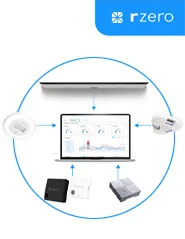
U.S. Department of Health and Human Services Launches New Initiatives to Reduce Carbon Emissions in Healthcare
Last week, the U.S. Department of Health and Human Services (HHS) announced new initiatives focused on reducing carbon emissions and preparing for climate-related challenges in the healthcare sector.
A recent analysis by the National Commission on Climate and Workforce Health reveals that less than 1 in 5 business leaders feel fully prepared to address long-term, climate-driven health risks facing their workforce. This highlights the importance of collaboration between the public and private sectors to address climate-related impacts on business.
Here’s a quick recap of the initiatives HHS is planning to implement:
Expanding Collaboration for Sustainable Procurement
HHS has expanded its collaboration with England’s National Health Service (NHS) to document overlaps in national procurement standards for health sector suppliers. This collaboration now includes the Australian government, Health Services Executive Ireland, and The Norwegian Hospital Procurement Trust. By aligning procurement standards, particularly in carbon emissions disclosures and target setting, all participating nations can collectively work towards reducing their carbon footprint.
Investing in Energy and Building Efficiency
To encourage healthcare providers to invest in clean energy and building efficiency, HHS is opening up a second phase of its Office of Climate Change and Health Equity Catalytic Program. This program will help providers take advantage of tax credits offered by the Inflation Reduction Act (IRA). Via the program, monthly webinars and other content will be created to support the adoption of relevant IRA programs.
Understanding and Documenting Greenhouse Gas Emissions
HHS has also released a guide for healthcare providers on understanding and documenting their Scope 3 greenhouse gas emissions. This includes indirect emissions associated with an organization’s value chain. By providing guidance on measuring and reporting emissions, HHS aims to help healthcare providers identify areas for improvement and develop strategies to reduce their environmental impact.
Addressing Climate Change in the Healthcare System
These new initiatives come on the heels of the Centers for Medicare & Medicaid Services’ Innovation Center announcing a voluntary Decarbonization and Resilience Initiative. This initiative aims to address climate change threats to the nation’s health and healthcare system. By monitoring and addressing hospital carbon emissions, participating organizations can improve health outcomes, reduce costs, and enhance overall quality of care.
Start Planning for Energy-Efficient Outcomes with R-Zero
At R-Zero our goal is to create healthier and more responsive buildings by using intelligent solutions that optimize spaces for the benefit of people, energy, and sustainability. For a complete assessment of how our solutions can help you drive reductions in energy costs and GHG emissions, check out our building intelligence solutions for the healthcare sector.

